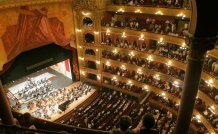Articles

The study will analyse the impact of ‘theatrical’ performances by British orchestras.
Major new study will investigate impact of innovative orchestra performances which use dance, drama and film
A major new study will analyse the impact of ‘theatrical’ performances by British orchestras, which use dance, acting and film, and are attracting new audiences.
Dr Adrian Curtin, from the University of Exeter, has been awarded a British Academy Mid-Career Fellowship for his one-year project, which will investigate the practice of ‘orchestral theatre’ – one of the most exciting and innovative developments in orchestral music-making in recent years.
Ensembles in the UK and elsewhere are exploring new possibilities for what an orchestra can do. Groups such as Aurora Orchestra, Scottish Ensemble, Paraorchestra, and Southbank Sinfonia collaborate with artists from other disciplines to create unique performance projects. Musicians in these ensembles may engage in choreographed movement, like a dancer, or represent a fictional character, like an actor. They may perform alongside artists from other disciplines, sometimes in non-traditional venues. These ensembles and others are challenging conventional understanding of the orchestra, of musicians as performers, of borders between art forms, and of orchestral repertoire.
Dr Curtin will conduct the first comprehensive scholarly investigation of this phenomenon. The research will be accompanied by a tailored programme of public engagement, including a new podcast series, public lectures, and an online conference.
Dr Curtin said: ‘Orchestras are becoming increasingly daring and creative in how they present themselves and how they perform. It’s a time of great creativity but also uncertainty.
Professional classical music ensembles, like many other organisations and institutions in the cultural sector, face an existential challenge in the wake of the Covid-19 pandemic and the climate crisis. The status quo is unsustainable and perhaps also undesirable, at least in part. Novel approaches to presenting orchestral performance may assist organisations to remain solvent and responsive to cultural preferences and contemporary concerns.
“Orchestral theatre’ is not a commercially-minded gimmick, though. It’s part of the ongoing exploration of Western “art music” as a living, evolving tradition. Increased attention to stagecraft and interdisciplinary collaboration can reveal new aspects of orchestral repertoire, enabling audiences to appreciate music’s embodied, intersensorial dynamics, as well as its dramatic potential, uniquely and in a heightened manner.”
Dr Curtin will interview musicians and other artistic collaborators and will document artistic processes. Interviews will seek to uncover how and why each of the ensembles has developed their own performance aesthetic and how projects were conceived and executed. He will analyse scores and performances, and also programmes, publicity materials, and audience responses.
Research conducted for the project will be used to create a multi-part podcast series. Episodes will engage with the cultural history of this phenomenon, connections between drama, theatre, and Western art music, interviews with key players, and analyses of performance projects. The podcast will be hosted by the Centre for Performance Histories and Cultures at the University of Exeter. The fellowship will also result in a scholarly monograph on this topic.
Date: 9 May 2022
